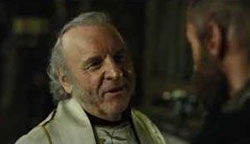 I said recently that film might be one of the last places where real enchantment is still experienced. And mainstream cinema, to reinforce my point, has been giving us a good measure, pressed down, shaken together, running over, into our lap. The Hobbit, Life of Pi, and now Les Misérables.
I said recently that film might be one of the last places where real enchantment is still experienced. And mainstream cinema, to reinforce my point, has been giving us a good measure, pressed down, shaken together, running over, into our lap. The Hobbit, Life of Pi, and now Les Misérables.
The movie is the first of the musical version of the French historical novel by Victor Hugo, first published in 1862.
With archetypal themes, statements, events, and characters it intertwines deeply with our spiritual life. There is evil, love, forgiveness, guilt, grief, commitment, life after death, the church, a good bishop, God, Christ,…
Toward the end of the novel, Hugo explains the work’s overarching structure:
The book which the reader has before him at this moment is, from one end to the other, in its entirety and details … a progress from evil to good, from injustice to justice, from falsehood to truth, from night to day, from appetite to conscience, from corruption to life; from bestiality to duty, from hell to heaven, from nothingness to God. The starting point: matter, destination: the soul. The hydra at the beginning, the angel at the end.

That aside, the minor character of the bishop is central to the story. Victor Hugo’s son, then in his 20s, argued, following popular anticlericalism, that the person who launches Jean Valjean’s transformation be someone from a secular profession. But Monseigneur Bienvenue’s (Bishop Welcome) significance was increased rather than decreased by the author. For Victor Hugo corrupt priests would be shamed in comparison to the ideal he was holding before them.
The bishop has Valjean keep the silver, protects him from the police, and as a Christ-figure and mediator of Christ “buys” the ex-convicts soul for God with two silver candlesticks, telling him to use the treasure to begin a virtuous new life.
The bishop breaks the command against lying to save Valjean. Javert, the antagonist, knows only keeping the law. This is his undoing.
[Interesting bit: Colm Wilkinson, who plays the bishop in the movie, played the role of Jean Valjean in Les Misérables when it first came out as a stage musical.]
The book, the musical, and now the movie are gifts to our spiritual lives, and to our preaching, and teaching, and living.
If you appreciated this post, there are different ways to keep in touch with the community around this website: like the facebook page, follow twitter, use the RSS feed,…





Having seen the stage play a couple of times, I saw the movie last night. I’m not ashamed to say cried my way through it yet again. It makes me want to shake people out of their self satisfied lives, and remind them that truly to love is what we are called to do. (Yes I am talking about the church as a whole, no all of it but some) thank God for reminders such as this film. Sue
About 15 years ago, a pair of French Canadians wrote a musical version of Notre-Dame de Paris, which we saw in France, and which was produced in England / English. For reasons I cannot understand, it was never the success it deserved to be: same eternal questions of good vs evil, etc, as used to describe Les Mis. And on a smaller, more accessible scale too, in my opinion. It has always bothered me that it has never made it in the anglophone world, for the characters are wonderfully portrayed from gypsy girl to Priest en passant par Quasimodo the hunchback with the pure heart. Why did I write this? Probably because I love it, and because it made a wonderful teaching tool that enabled me to combine French and R.E!
Blessings, Bosco.
B
Thanks, Barbara. I did a quick search. It is on Wikipedia, and there’s the whole production on YouTube. One song I saw, with English subtitles, has had about 8 million hits. Blessings.
I haven’t seen the movie yet, but read the book several years ago, and would very much like to. (yeah I’m one of those people who “read the book” a lot more often than “see the movie”)
Good on you for reading the book, Claudia! Enjoy the movie when you get to it. Blessings.
I have loved this musical since I first heard two of the songs in 1987 and ordered the CD then (a double and extremely expensive at $60) and have seen two professional and one amateur performance, and now the movie.
An article in the Church Times describes Valjean as almost a Christ-like figure:
“In an extraordinary episode, he makes his escape carrying the unconscious body of Marius down into the sewers of Paris, going deeper into the darkness, until, at one point, he starts to sink into the mud. In this “descent into hell’, which Hugo calls a burial and rebirth, Valjean becomes almost a Christ-figure. Javert recognises that he is finally thwarted, and takes his own life, echoing the fate of Judas.”
To me, Javert is like a Pharisee, worshipping the law and the rules, unable to understand or to accept mercy or forgiveness or redemption.
(The character I really don’t like much is Cosette, who seems a pretty thing with not much going on in her brain (or at least we are not given much insight into her character). I much prefer the gutsy Eponine any day.)
Thanks, Dorothy, for those wonderful insights. The bishop, too, functions IMO as a Christ-figure. [Another person found the part of Eponine in the story the very character she found irritating 🙂 ] Blessings.
This musical is one of my favorite things ever, and I was so afraid the movie would mess it up. It didn’t. I gave it 90% (I had high expectations!) and would recommend it to anyone.
I’ve heard people say that lovers of the musical wouldn’t like the movie because it wasn’t ‘pretty’, but it actually isn’t a pretty story in any form, and that’s one of the things I like about it. My favorite stage production was the one that presented scenes like Fantine’s prostitution as harshly and realistically as you could in a stage show. I like that the movie didn’t try to soften the story or protect the audience, if that makes sense (sorry, not very good at expressing what I mean here!)
There are so many other reasons I love this musical – Fantine’s final lines (in addition to seeing the movie twice, I’ve seen it on stage 4 times, and cried at this part every time), the finale, which basically says that even if life sucks and you die, you can still have a happy ending, but most of all, because there is no way that you can write God out of this story.
I am sorry, Cindy, that this post leaves you sad.
You would need to explain your point to me why his “elevation” to bishop is a “necessity“?
You list qualities in him that, I agree, are wonderful qualities in a bishop. To say bishops should have these qualities, he has these qualities, therefore he should be a bishop is, I’m sure you realise, back-to-front logic. [A cat should have four legs, this has four legs, therefore this is a cat].
A (arch)bishop oversees a (arch)diocese – do you really think overseeing an archaeological park is sufficient reason to ordain him an (arch)bishop?!
Blessings
Enjoyed your review and the bit about the chausable–totally missed it–you might be interested in a book I wrote about the theological correspondences between the novel and the musical: To Love Another Person–the one major suggestion I made in my book was to have the bishop on stage with Valjean and Fantine at the end instead of Eponine–wondered whether the director had read my piece–powerful text in the 19th century; made even more powerful by the marvelous music and lyrics–so much more than just another theater experience–John Morrison, Episcopal priest
Thanks John. For other readers, this is John’s book: To Love Another Person: A Spiritual Journey Through Les Miserables . I will be picking up ideas from this in my preaching in Lent – I doubt, sadly, that I will get your book in time. I might consider the Kindle version
. I will be picking up ideas from this in my preaching in Lent – I doubt, sadly, that I will get your book in time. I might consider the Kindle version
. Blessings.